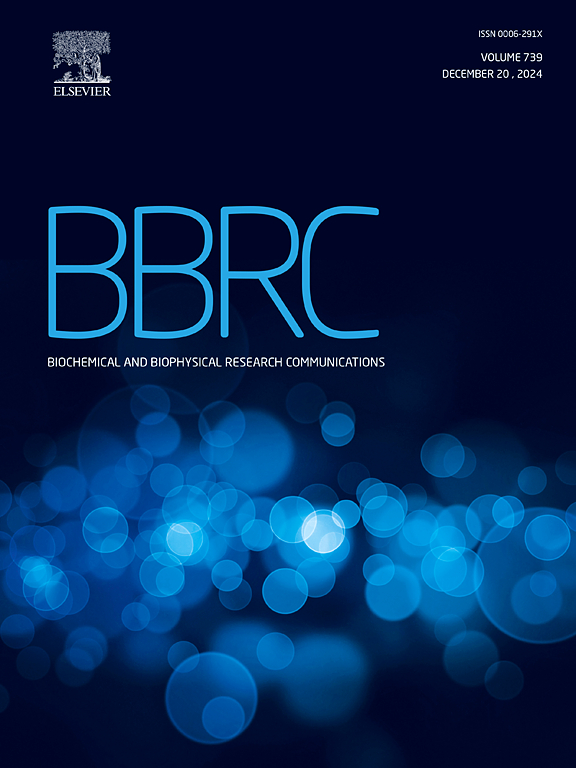小檗碱通过抑制cGAS-STING通路和减轻铁下垂来减轻肌腱病变
IF 2.5
3区 生物学
Q3 BIOCHEMISTRY & MOLECULAR BIOLOGY
Biochemical and biophysical research communications
Pub Date : 2025-05-01
DOI:10.1016/j.bbrc.2025.151923
引用次数: 0
摘要
小檗碱是黄连根茎中重要的生物活性成分,因其对多种疾病的治疗作用而被广泛研究。本研究旨在探讨小檗碱治疗肌腱病变的潜在益处,并通过动物和实验室研究阐明其潜在机制。我们的研究结果表明,小檗碱有效治疗I型胶原酶诱导的大鼠肌腱病变,细胞水平验证证实了这一点。在分子水平上,在动物模型和细胞培养中,小檗碱降低了cGAS-STING信号通路的激活,减少了丙二醛(MDA)和活性氧(ROS)的积累。此外,小檗碱上调组织中谷胱甘肽(GSH)和谷胱甘肽过氧化物酶4 (GPX4)的表达。提示小檗碱通过cGAS-STING通路减轻铁下垂,对肌腱病变有治疗作用。为了进一步验证这些发现,我们使用了铁下垂诱导剂咪唑酮伊拉斯汀(IKE)来评估小檗碱的效果。IKE显著降低了小檗碱对肌腱病变的治疗效果,正如前面提到的标志物所示。因此,小檗碱通过抑制cGAS-STING途径减轻了铁下垂,突出了其在治疗肌腱病变方面的潜力。本文章由计算机程序翻译,如有差异,请以英文原文为准。

Berberine alleviates tendinopathy by suppressing the cGAS-STING pathway and Relieving ferroptosis
Berberine, a key bioactive component of Coptis rhizome, has been extensively studied for its therapeutic effects on various diseases. This research aimed to investigate the potential benefits of berberine in treating tendinopathy and to elucidate the underlying mechanisms through animal and laboratory studies. Our findings indicated that berberine effectively treated type I collagenase-induced tendinopathy in rats, confirmed by cellular-level validation. At the molecular level, berberine reduced the activation of the cGAS-STING signaling pathway and decreased the accumulation of malondialdehyde (MDA) and reactive oxygen species (ROS) in both animal models and cell cultures. Additionally, berberine upregulated the expression of glutathione (GSH) and glutathione peroxidase 4 (GPX4) in tissues. These results suggested that berberine alleviated ferroptosis via the cGAS-STING pathway, thus exerting therapeutic effects on tendinopathy. To validate these findings further, we administered the ferroptosis inducer Imidazole Ketone Erastin (IKE) to evaluate the effects of berberine. IKE significantly diminished the therapeutic effects of berberine on tendinopathy, as indicated by the previously mentioned markers. Thus, berberine mitigated ferroptosis by inhibiting the cGAS-STING pathway, highlighting its potential in managing tendinopathy.
求助全文
通过发布文献求助,成功后即可免费获取论文全文。
去求助
来源期刊
CiteScore
6.10
自引率
0.00%
发文量
1400
审稿时长
14 days
期刊介绍:
Biochemical and Biophysical Research Communications is the premier international journal devoted to the very rapid dissemination of timely and significant experimental results in diverse fields of biological research. The development of the "Breakthroughs and Views" section brings the minireview format to the journal, and issues often contain collections of special interest manuscripts. BBRC is published weekly (52 issues/year).Research Areas now include: Biochemistry; biophysics; cell biology; developmental biology; immunology
; molecular biology; neurobiology; plant biology and proteomics

 求助内容:
求助内容: 应助结果提醒方式:
应助结果提醒方式:


